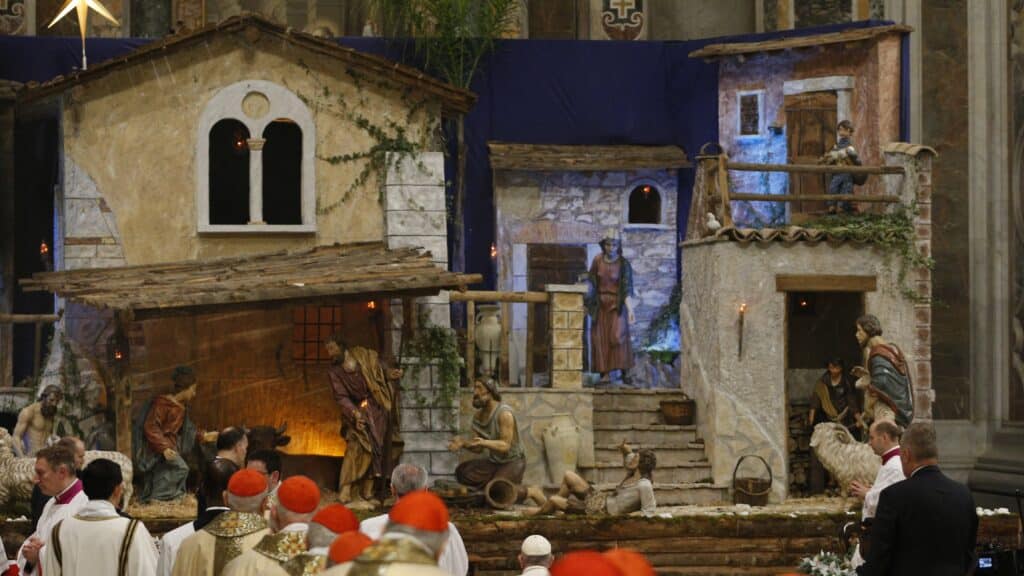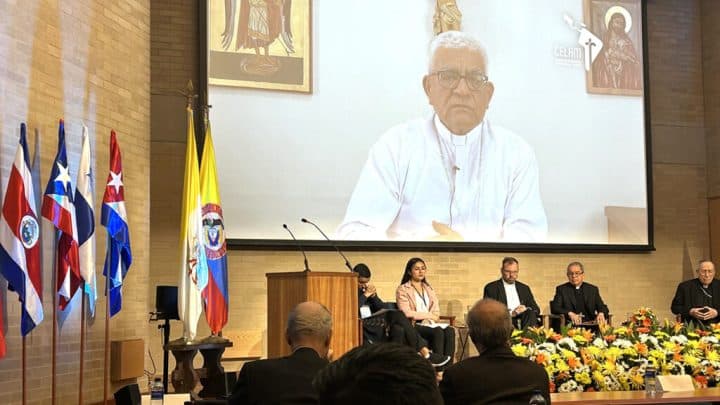
Q:Since Christmas is on Monday this year, can I go to a Christmas vigil Mass on Sunday and have it fulfill my Sunday and Christmas obligations? (Boston)
A: As you note, in 2023 Christmas Eve falls on a Sunday (which is also the Fourth Sunday of Advent). And like all Sundays, Catholics are required to attend Mass in person, unless there is some legitimate reason (like illness or inclement weather) that makes attending Mass unduly difficult or impossible.
Of course the next day, Monday, Dec. 25, is Christmas Day, which is also a holy day of obligation. Because there are two days of obligation — i.e., Sunday and Christmas — this means that there are two distinct obligations. Each separate obligation needs to be fulfilled by attending a separate Mass. That is, you cannot “double dip” by attending a Christmas Eve Mass that happens to be on Sunday and have this one Mass fulfill two obligations. (Note: In years when Christmas Day falls on a Sunday, Christmas essentially replaces the Sunday liturgically, which means there is only one obligation.)
Now for the part that can get confusing: even though you must attend two Masses to fulfill the two obligations, all this means is that you must go to Mass on that calendar day or attend a vigil Mass the evening before. The readings and prayers do not necessarily need to match the day whose obligation you are fulfilling.
So, you could go to a Christmas vigil Mass on Sunday, Dec. 24, and have it count as your Fourth Sunday of Advent obligation this year; but if you intend for it to fulfill your Sunday obligation, then you must also attend another Mass on Christmas Day to fulfill your obligation for the holy day.
Of course, if you were to attend a vigil Mass on Saturday, Dec. 23, for the Fourth Sunday of Advent, and then the Christmas vigil Mass on Sunday (Christmas Eve) for Christmas Day, then you’ve got it all covered.
Can the church be decorated with artificial flowers or plants?
Q: I am a member of our altar society and was told we are not to use artificial flowers/plants to decorate the altar. Yet, during the Christmas season artificial trees with elaborate shopping mall decorations are displayed on the altar. Please explain the rationale and guidelines. There seems to be a contradiction. (City withheld, Hawaii)
A: As far as I can find, there is nothing in the church’s universal law that strictly prohibits using artificial plants or flowers as sanctuary decorations.
The General Instruction of the Roman Missal (i.e., the “instruction book” for how Mass should be celebrated) does not discuss silk versus natural flowers, but in paragraph 305 it does specify that: “During Advent the floral decoration of the altar should be marked by a moderation suited to the character of this time of year,” and that “During Lent it is forbidden for the altar to be decorated with flowers. Exceptions, however, are Laetare Sunday (Fourth Sunday of Lent), Solemnities, and Feasts.”
However, in 2000 the United States Conference of Catholic Bishops issued its own document with guidelines on the proper celebration of the liturgy titled “Built of Living Stones.” In this document, paragraph 129 states a clear preference for decorating with natural plants, noting: “The use of living flowers and plants, rather than artificial greens, serves as a reminder of the gift of life God has given to the human community. Planning for plants and flowers should include not only the procurement and placement but also the continuing care needed to sustain living things.”
Granted, this is a stated preference and not an absolute prohibition. But it could be that your specific parish or diocese has a policy of using only natural plants.
But even in places where natural plants are strongly preferred, practically speaking I imagine that Christmas trees, wreaths, and other evergreen garlands are one case where it might be reasonable to make an exception and use artificial greenery. As anyone who has ever had a real Christmas tree in their home knows, the regular shedding of dead pine needles can create quite the ongoing clean-up project, which might become overly burdensome to altar societies or those charged with care of the sanctuary.
Jenna Marie Cooper, who holds a licentiate in canon law, is a consecrated virgin and a canonist whose column appears weekly at OSV News. Send your questions to CatholicQA@osv.com.




